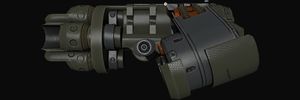Difference between revisions of "Weapon HSW nfc MNL"
Jump to navigation
Jump to search
| (3 intermediate revisions by the same user not shown) | |||
| Line 14: | Line 14: | ||
|unit_cost=40 combat<br \>25 Support<br \>0 Command | |unit_cost=40 combat<br \>25 Support<br \>0 Command | ||
| − | |weight= | + | |weight=18kg |
|cartridge=MN 40mm | |cartridge=MN 40mm | ||
| Line 24: | Line 24: | ||
|slots=1x Sights<br \>2x Body | |slots=1x Sights<br \>2x Body | ||
}} | }} | ||
| + | |||
| + | The MNL developed by Taldis utilizes a rotating feed mechanism to preload rounds into the barrels to be fired with electric primers. This weapon is used as a force multiplier to clear fortified locations to devastating effect, or alternatively as an area denial weapon for defensive purposes. The MN 40mm cartridge uses a dynamic material that can be pre-programmed to either be repelled from or stick to surfaces from the computerized fire control system (FCS) embedded in the weapon's components. | ||
{{Navbox weapons}} | {{Navbox weapons}} | ||
[[Category:Infantry_Weapon]] | [[Category:Infantry_Weapon]] | ||
Latest revision as of 22:34, 26 September 2018
| Multi Nade Launcher (MNL) | |
|---|---|
 MNL System | |
| Type | Multi Grenade Launcher |
| Service | |
| Used by |
Antarean Imperial Army United League Army |
| Wars | Second Antarean War |
| Production | |
| Manufacturer | Taldis |
| Unit cost |
40 combat 25 Support 0 Command |
| Specifications | |
| Weight | 18kg |
| Cartridge | MN 40mm |
| Operation | |
| Damage Inflicted | 150 per cluster |
| Rate of fire | 0.5 /s |
| Optimal range | Expression error: Unexpected < operator. m |
| Secondary Firing Mode | Error: no local variable "mode" was set. |
| Magazine | 8 rounds |
| Spare Magazines | 6 |
| Mod slots |
1x Sights 2x Body |
|
| |
The MNL developed by Taldis utilizes a rotating feed mechanism to preload rounds into the barrels to be fired with electric primers. This weapon is used as a force multiplier to clear fortified locations to devastating effect, or alternatively as an area denial weapon for defensive purposes. The MN 40mm cartridge uses a dynamic material that can be pre-programmed to either be repelled from or stick to surfaces from the computerized fire control system (FCS) embedded in the weapon's components.
| ||||||||||||||||||